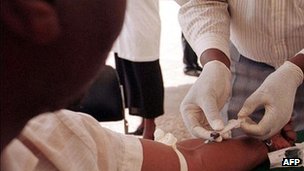BAK
JF-Expert Member
- Feb 11, 2007
- 124,790
- 288,007
Kenya recalls 'faulty' South Korean HIV kits

There has been a sharp increase in the number of Kenyans who go for HIV tests
Related Stories
Kenya has recalled one million HIV testing kits because of fears about their accuracy, a health official has said.
The WHO had raised an alert about the kit after finding half the test results could be wrong, said Shahnaz Sharif.
But there was no reason to panic as the South Korean-manufactured kit was one of several used to diagnose the HIV status of people, Dr Sharif said.
Kenya, like most of Africa, is trying to contain the HIV/Aids pandemic.
International aids charity Avert says HIV testing has increased sharply in the past decade in the East African state, following a government-backed campaign to create more awareness about the illness.
In 2000, Kenya had only three voluntary testing and counselling sites, but the number had risen to nearly 1,000 by 2007, it says.
'Tie-breaker test' Dr Sharif, Kenya's director of Public Health and Sanitation, told the BBC's Focus on Africa programme that the Standard Diagnostic Bioline (SDB) kit, manufactured by a South Korean company, had wrongly diagnosed people.
"Start Quote
"The discrepancy rate was about 50% and the WHO [World Health Organisation] has asked all countries to put on hold use of Bioline," he said.
"About 50% of positives may have been reported as negative and 50% of negatives as positive."
The WHO had detected the unreliability of SDB, which was widely used by countries in sub-Saharan Africa, Dr Sharif said.
But Kenyans should not be alarmed because the SDB test is one of three tests that health officials carry out on people to make sure their HIV status is correctly diagnosed, he said.
"People are really worried and asking if it is going to affect them. The answer is no," Dr Sharif said, adding that a "tie-breaker" test was normally conducted if there were conflicting results.
More than one million Kenyans are HIV-positive.

There has been a sharp increase in the number of Kenyans who go for HIV tests
Related Stories
Kenya has recalled one million HIV testing kits because of fears about their accuracy, a health official has said.
The WHO had raised an alert about the kit after finding half the test results could be wrong, said Shahnaz Sharif.
But there was no reason to panic as the South Korean-manufactured kit was one of several used to diagnose the HIV status of people, Dr Sharif said.
Kenya, like most of Africa, is trying to contain the HIV/Aids pandemic.
International aids charity Avert says HIV testing has increased sharply in the past decade in the East African state, following a government-backed campaign to create more awareness about the illness.
In 2000, Kenya had only three voluntary testing and counselling sites, but the number had risen to nearly 1,000 by 2007, it says.
'Tie-breaker test' Dr Sharif, Kenya's director of Public Health and Sanitation, told the BBC's Focus on Africa programme that the Standard Diagnostic Bioline (SDB) kit, manufactured by a South Korean company, had wrongly diagnosed people.
"Start Quote
People are really worried and asking if it [faulty HIV testing kits] is going to affect them. The answer is no"
End Quote Dr Shahnaz Sharif Kenyan health official
"The discrepancy rate was about 50% and the WHO [World Health Organisation] has asked all countries to put on hold use of Bioline," he said.
"About 50% of positives may have been reported as negative and 50% of negatives as positive."
The WHO had detected the unreliability of SDB, which was widely used by countries in sub-Saharan Africa, Dr Sharif said.
But Kenyans should not be alarmed because the SDB test is one of three tests that health officials carry out on people to make sure their HIV status is correctly diagnosed, he said.
"People are really worried and asking if it is going to affect them. The answer is no," Dr Sharif said, adding that a "tie-breaker" test was normally conducted if there were conflicting results.
More than one million Kenyans are HIV-positive.